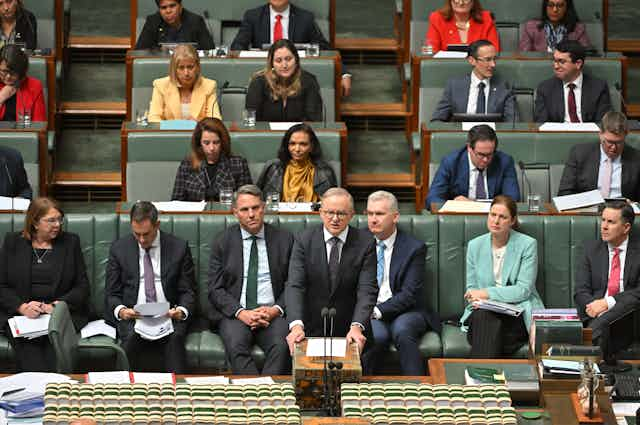The Greens and the Coalition have teamed up again to present a vote being taken on the government’s $10 billion Housing Australia Future Fund.
Consideration of the legislation has been delayed until October 16.
The government at the weekend announced an immediate $2 billion for social housing – which will go to states and territories over this fortnight – hoping that would persuade the Greens to support the fund.
But the Greens are holding out for controls on rents, which are actually within the jurisdiction of the states.
Anthony Albanese, answering a Greens question in parliament, said the Greens had made themselves “irrelevant to the debate”.
“I understand that renters are doing it tough,” he said. “Yes, I want to do things about that”, and the government was working with the states on various measures. But “what we are not doing is destroying supply while we do it. Because the key to fixing housing is supply.”
If the government did what the Greens wanted there would be less supply of housing, Albanese said.. The Greens should have had “the guts” to vote against the legislation rather than deferring it.
The Minister for Housing, Julie Collins, said “there is a cost to these delays.
"Every day of delay is more than $1.3 million that does not go to housing for people that need it. If this bill gets delayed until October, the Greens political party and the Liberals would have succeeded in delaying it for more than six months. Every six months is $250 million that could have gone to building more homes.”
This is the second time the Greens and Coalition have prevented a vote on the legislation. The proposed $10 billion fund would produce $500 million a year for social and affordable rental housing.
Finance Minister Katy Gallagher said the fund was “an important piece of national infrastructure”.
Opposition leader in the Senate Simon Birmingham told Sky the Coalition had “always thought that adding these billions of dollars extra to government debt for no immediate impact on the housing market was a bad idea, especially so for a policy that has no benefit in terms of addressing rates of home ownership in Australia”.
The Senate’s action prompted speculation that the deferral could form the initial step to having the bill qualify as double dissolution legislation. Special Minister of State Don Farrell said: “If the Senate defers bills to October, the government will regard this as the Senate failing to pass the bill, and I’m sure you understand the consequences of that”.
Greens leader Adam Bandt said that “it says a lot about the government that they’d rather tout this as a double dissolution trigger rather than negotiating to pass their own bill”.
The Constitution’s Section 57 provides that if the House of Representatives passes a bill and the Senate “rejects or fails to pass it” and after three months the lower house again passes the bill and the Senate again rejects or fails to pass it, it can become the basis for a dissolution of both houses.
Sydney University constitutional expert Anne Twomey said the High Court has previously held that the Senate needs a reasonable amount of time to debate and deliberate upon a bill.
“This may include sending it to a parliamentary committee. But in this case, the delay is not due to a need to deliberate. It is for the purpose of waiting to see if the Albanese Government will change its policy and negotiate an agreement in National Cabinet which suits the policy aim of the Greens,” Twomey said.
“While there is no certainty, the government would have a good case to argue that a delay of this kind amounts to a failure to pass. Even taking into account the winter recess, there is still plenty of time to properly debate the bill before 16 October”.

